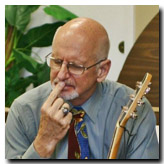 Last Sunday I heard our congregation sing!
Last Sunday I heard our congregation sing!
Let me explain. I’m a member of our worship team. (That’s me up top trying to remember how to play the guitar!) I suppose it’s primarily because I’m surrounded by other team members playing and monitors playing back that I rarely hear the people singing. Last Sunday when we reached verse 3 of “O for a Thousand Tongues to Sing” the instruments dropped out and we did “voices only.” Of course I heard everyone then. But when the instruments returned for the last verse I still heard the congregation singing. It was great. It was great because I was hearing our whole church family engaged in worship, not just the worship team.
This morning I read a blog by Jamie Brown entitled, “Worship at a Crossroads: Congregationalism versus Performancism”. http://worthilymagnify.com/2014/09/30/worship-at-a-crossroads-congregationalism-versus-performancism/ In it, Brown says that the “worship wars” (between organs and guitars, choirs and praise bands, etc.) are over. “They were mainly about style,” he explains. Now, he argues, the conversation is about substance. It’s about “two models of worship leading.” One he calls “congregationalism”. This views the congregation’s engagement as integral to the success of the worship service. The other model he calls “performancism.” This views the congregation’s engagement as incidental to the worship service’s success. In this model the people just “experience” or “feel” the “performance.” “Engagement” he defines as “the congregation’s active participation, in unity and with comprehension, throughout the majority of the service.” It’s important to note that this has nothing to do with traditional or contemporary music (that is, with style). Either, he insists, can be successful in the congregation’s engagement.
There’s no question where Brown stands. The worship leader’s work is to lead the congregation to engage in worship. He concludes with a prayer “that a fresh commitment to congregational worship will sweep across the church worldwide, overturning performcism, and drawing the Bride of Christ into increasing unity in the years to come.”
Our worship team isn’t caught up in performcism. We really see the congregation’s engagement as integral to “worship success.” But that can be tricky. The volume of the worship team can’t be too loud (or that’s all people will hear) or too soft (or some will be afraid to sing at all). The lyrics must harmonize with Scripture. (Not only do we want to praise God with truth; we want to be learning truth as we sing.) The melody must be “singable”, otherwise people will be so focused on singing the right notes they’ll be paying no attention to the words. The worship team must convey a demeanor of worship. In other words, the worship team must be worshiping. As our pastor says, “The worship team isn’t composed of worship leaders but lead worshipers.” Only then can we lead the people into engaged worship.
We don’t want to be slick performers. Nor do we want to be bumbling detractors. We want to be lead worshipers helping to guide the whole congregation after us into engaged worship. In the paragraph above I noted several “musts” for doing that. Here’s one more: we (worship team and congregation) must remember that when we gather, we are not just coming together, but also coming before our Lord and entering into his holy presence. David wrote of this in two psalms . . .
One thing have I asked of the LORD, that will I seek after: that I may dwell in the house of the LORD all the days of my life, to gaze upon the beauty of the LORD and to inquire (or, meditate) in his temple (Psalm 27:4).
O God, you are my God; earnestly I seek you; my soul thirsts for you; my flesh faints for you, as in a dry and weary land where there is no water. So I have looked upon you in the sanctuary, beholding your power and glory. Because your steadfast love is better than life, my lips will praise you. So I will bless you as long as I live; in your name I will lift up my hands. My soul will be satisfied as with fat and rich food, and my mouth will praise you with joyful lips . . . (Psalm 63:1-5).
In both Psalms David seeks wholeheartedly after the Lord. Like a man in a waterless wasteland, his soul thirsts after the Lord. He wants to praise the Lord with his lips, to lift up his hands in the Lord’s name, to bless the Lord all his days. As he does, he knows his very soul will be satisfied.
This is engaged worship of our Lord in whose presence there is joy. I long for more of it, don’t you? This Sunday I hope we all will hear one another sing to the Lord like that. If so, we will both sense his presence and go back out into the world full.
Recent Comments